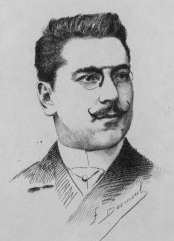Léon Xanrof

Léon Xanrof
Léon Alfred Fourneau (9 December 1867, in Paris – 17 May 1953, in Paris) was a French humourist, music-hall artist, playwright and songwriter. Originally trained as a lawyer he invented the stage- and penname Xanrof by inversion of the Latin fornax of his French surname fourneau ("furnace"), before finally legally changing his name to Léon Xanrof.[1][2] Yvette Guilbert experienced early success singing Xanrof's songs at Rodolphe Salis' cabaret Le Chat Noir.[3][4][5][6]
Works
- Songs
- À présent qu'on n'est plus ensemble, dittie, lyrics by Léon Xanrof, music by E. Jaquinot.
- Rive gauche, chansons d'étudiants (1888)
- Chansons sans-gène (1890)
- Chansons parisiennes, répertoire du Chat noir (1890-1891)
- Chansons à Madame (1891)
- Pochards et pochades, histoires du Quartier Latin (1891)
- Chansons à rire (1892)
- L'Anarchiste, lyrics and music by Léon Xanrof. P. Dupont, (1892).
- L'Amour et la vie, nouvelles (1894)
- Lettres ouvertes (1894)
- Bébé qui chante (1894)
- Chansons ironiques (1895)
- La Forme ! la fô.. ô.. orme ! (1897)
- Juju, recueil de nouvelles et de saynètes (1897)
- L'Œil du voisin, recueil de contes (1897)
- De l'autel à l'hôtel (1902)
- Une et un font trois (1903)
- C'est pour rire (1911)
- Le Mécanique de l'Esprit (1931)
- Chacun treize à la douzaine (1933)
- Theatre
- 1888: Chez le peintre, farce d'atelier in 1 act, with M. Bernac, Paris, Théâtre d'Application, 8 March
- 1896: Ohé, l'amour ! revue in 2 tableaux, with Cellarius, Paris, Scala, 18 April
- 1897: Madame Putiphar, three-act operetta, with Ernest Depré, music byEdmond Diet, Paris, Théâtre de l'Athénée, 27 February
- 1901: Pour être aimée, three-act comedy, with Michel Carré, Paris, Théâtre de l'Athénée, 27 February
- 1903: The Prince Consort, three-act comedy, with Jules Chancel, Théâtre de l'Athénée, 25 November, which was used to create the 1929 film Parade d'amour (The Love Parade).
- 1905: Son premier voyage, comedy in 1 act and 2 tableaux, Paris, Théâtre des Deux Masques, 5 November
- 1906: En douceur, one-act comedy, with Pierre Veber, Paris, Théâtre des Mathurins, 23 October
- 1908: Un coup de foudre, three-act vaudeville, Paris, Théâtre des Folies-Dramatiques, 16 April
- 1908: S.A.R. (Son Altesse royale), three-act musical comedy, with Jules Chancel, music by Ivan Caryll, Paris, Théâtre des Bouffes-Parisiens, 11 November
- 1910: Rève de valse, three-act operetta, adaptation by Léon Xanrof and Jules Chancel, after Felix Dörmann et Leopold Jacobson, music by Oscar Straus, Paris, Théâtre de l'Apollo
- 1911: Les Petites étoiles, three-act operetta, with Pierre Veber, music by Henri Hirchmann, Paris, Théâtre Apollo, 23 December
- Cinema
- 1911: La Fête de Marguerite, script by Léon Xanrof, Pathé frères
References
- ↑ Jean Lec -Léon Xanrof 1945
- ↑ Peter Leslie, A hard act to follow: a music hall review 1978 "Xanrof had gained his experience in the wineshops of the faubourgs along the outer boulevards, working-class taverns where anarchists and other revolutionaries had been singing, writing and reciting anti-establishment tirades since... "
- ↑ The Oxford Handbook of the New Cultural History of Music Jane Fulcher - 2011 "Three decisive events shaped the fame of the divette fin de siècle: The discovery of Léon Xanrof's songs, her first performance at Rodolphe de Salis's cabaret, Le Chat Noir (in 1892), and her short tenure at the Éden Concert in December ..."
- ↑ Carlton M. Hughes - 2002 Moments for Music: 175 Short Stories About Music p55 "Léon Xanrof [ aka Léon Fourneau] (1867-1953) worked "
- ↑ Adrian Room -Dictionary of Pseudonyms: 13,000 Assumed Names and Their Origins p516 2010 -"Xanrof: Léon-Alfred Fourneau (1867–1953), Fr. composer, songwriter, by profession a lawyer."
- ↑ Derek B. Scott - Sounds of the Metropolis 2008 p69 "In Paris, Yvette Guilbert represented bourgeois vices humorously in chansons like "Le Fiacre" (words and music by Léon Xanrof) and "Je suis pocharde!" (words by Léon Laroche, music by Louis Byrec)."
External links
- Léon Xanrof on IMDb
This article is issued from
Wikipedia.
The text is licensed under Creative Commons - Attribution - Sharealike.
Additional terms may apply for the media files.